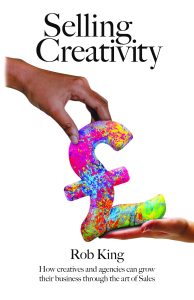By Rob King, founder and CEO of The Client Key and author of Selling Creativity
 SMEs have differing views on their need or obligations to sell. But to see real startup success, leaders need to know how to sell or pitch themselves and their business. Whether it’s with investors, customers or current and prospective employees, SMEs need to get others to buy into a product, a service or an idea. There is an exchange of views, of thoughts and ideas that must be delivered in an engaging way.
SMEs have differing views on their need or obligations to sell. But to see real startup success, leaders need to know how to sell or pitch themselves and their business. Whether it’s with investors, customers or current and prospective employees, SMEs need to get others to buy into a product, a service or an idea. There is an exchange of views, of thoughts and ideas that must be delivered in an engaging way.
Sadly, on the whole, the modern salesperson has an image problem. Mention the word ‘sales’ and we immediately think of shiny suits and door-to-door knocking, or of cold calling (cold calling has quite a lot to answer for with sale’s image problems), and of pushy aggressive, stereotypical young guns eager to make a quick buck at our expense. Or of pyramid schemes, or dodgy financial selling.
Keep your guard up at all times! Never allow these people the time of day, let alone a civilised conversation. Don’t answer calls or emails from anyone that remotely displays any of these behavioural traits. They are all bad. They would sell their own grandmother given half the chance and they have nothing to offer me. Furthermore, they want something from me and therefore I must avoid them at all costs.
Sound familiar?
This is how we’ve been conditioned to behave and be wary of any kind of transactional sale. The idea of being ‘sold to’ has become problematic and collectively we don’t like it.
I started out at 18 years old with my first job in the IT industry – selling photocopiers for an office equipment firm. My job was to book appointments for the sales team to go in and meet clients; in those days, all of which was done over the phone. I was very good at it and broke all the company records. This job ultimately taught me many things: principally, how to sell, how to be highly persuasive, and how to get the required result, all without being overly aggressive, which so many people used to do. Photocopiers and IT equipment are fairly low down the list of priorities for most people. Therefore, I have always maintained – if you can sell this kind of product, you can do anything.
But yet here’s the thing…
A truly great salesperson is a magician. They are a master in their ability to conjure up ‘something from nothing’ in commercial terms at least. They have the power to radically change the course of a company simply through the transactional act of selling something. A great salesperson (and there are millions of them in the world, you just might not have noticed them) is truly one of the greatest assets your company can have. They can grow companies by many multiples – and often in a relatively short space of time. They secure business worth millions of pounds, ensuring companies large and small can employ armies of people in various industries.
Here are my top 10 Tips to help you be highly persuasive without being overly aggressive:
- Forget trying to sell them something
Forget that idea for a moment. Instead think about understanding them and their needs first and foremost. Then ask yourself: does it align with us?
- Focusing on product not people
Don’t forget the golden rule of ‘People first, product second’. Recognise how your clients are approaching any sale and respond primarily to their needs, not yours.
- Stop confusing people
Keep it simple, especially at first. Don’t dumb it down but don’t bamboozle people. No jargon. Help make things very simple for them to understand in a short space of time.
- Don’t think everyone is a prospect
They are not. Qualify and do your homework on prospects. Go after the right people and businesses for you.
- Stop talking at people
Enough said – listen more than you talk! (you might not even be aware you do this) Ask people for feedback if you’re unsure!
- Avoid heavy handedness
Bad timing is the death of many a sale. Don’t go too hard, too soon, too often – it will have the opposite effect to that intended. You want a lightness of touch as opposed to an over-keen approach.
- DON’T read from a script
Know what you want to say, but don’t stick to a verbatim script whatever you do.
- Not being yourself
You do not need to invent some alter ego of who you think the client wants you to be. Be yourself and allow that to come through; people will buy ‘you’ as much as anything.
- Aggressive sales tactics
These never work and are the bad side of selling. Pushing to get deals done inappropriately is a huge NO. You need to have a degree of self-awareness here to realise what is acceptable. If it feels wrong, it almost certainly is.
- Tense conversations
Get to a place where you and the client have both relaxed a bit. Lower those tension levels by being yourself; be human. Allow the other person space and the conversation to breathe as much as possible. 
Rob King is the founder and CEO of creative sales company The Client Key and author of Selling Creativity


